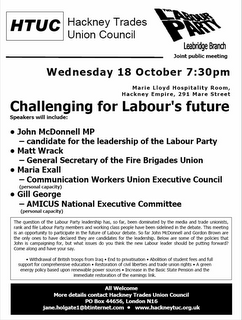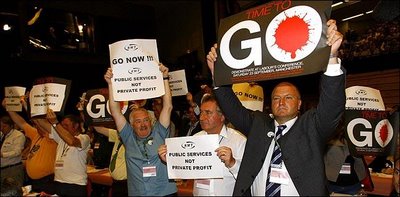Some thoughts about how to make the leadership election a positive experience for Labour
Elections should be enjoyable experiences where the campaigners get a buzz out of promoting a person and policies they agree with and the electorate feel empowered.
If the preliminaries to the election of a new Labour Leader are anything to go by, there is a risk it will not be that kind of experience. So far everything has been about fear and negativity and division, not about finding what unites us, celebrating debate and diversity and empowering the electors - in this case the three sections of the electoral college (union members, party members and the PLP).
A good example of this is Polly Toynbee's nasty article today attacking John Reid for having the temerity to even hint at thinking about standing. Toynbee presents herself as a Brown supporter. She does Brown a great disservice with her attack on Reid. Toynbee is alienating Labour moderates who might be instinctively inclined to support Brown with crude attacks like this. In the most likely outcome of there being a Brown premiership he will need people like Reid in the Cabinet - they appeal to a segment of Labour's core working class support concerned about security issues. Just as Blair called for an end to ministers and ex-ministers playing the man not the ball after Charles Clarke's outburst a couple of weeks ago, so we need commentators and journalists to critique the policies on offer not trash the possible candidates. Unlike Toynbee John Reid has earnt a right to say what he thinks about the future direction of Labour. When she was in the SDP trying to destroy Labour, Reid was in Kinnock's office trying to rebuild it. Anyone who has had his breadth of Cabinet experience can be attacked for their views but can't be written off as not a "serious candidate" as Toynbee does. The left wing component of Brown's support around Compass also need to be muzzled - they clearly haven't won his ear on policy but their anti-Blairite rantings are driving away some of Brown's potential moderate supporters.
We need to stop questioning people's motives. That cuts both ways. It means acknowledging that however wrong they were, the letter signers of two weeks ago acted in what they thought were the Party's best interests. But also that people floating new policy ideas are not all wreckers, extremists, "people who don't belong in the Party" or agents provocateurs. And that those of us wanting to express our loyalty to Blair are not seeking to damage Brown given that he is the person we are most likely to have as our leader in the next General Election. The worst outcome of a leadership election would be one where we attack each other during the campaign so much that the winner is "damaged goods" when they go head to head with Cameron and the Tories.
We need to attract support to our chosen candidates for positive reasons - their policies, values and character - not negative reasons like "stopping" another candidate or avoiding a black spot when it comes to career advancement.
We need the rival camps to stop going nuclear and playing "for keeps". The choice of leader is important but it isn't Benn vs. Healey struggling for the soul and future of the Party. It is likely to be about nuance and detail between people who agree on the fundamentals and will need to work together in future. Like Wellington when an artillery battery at Waterloo told him they had Napoleon in their sights, we need candidates who will understand that it isn't the done thing to shell the opposing commander.
We need the candidates to look like they don't mind losing. Because democracy can't work unless candidates accept that not always winning is an occupational hazard and comes with letting large numbers of people vote on what your next job will be.
We have to involve the 190,000 party members and the millions of affiliated trade unionists in the debate. So far they feel totally alienated by a process being played out in the Westminster Village and the media. They have to feel they chose the Leader, not just woke up one day and discovered they had a new one. That means a contested election even if the outcome will be exactly the same as a non-contest. Mutterings about the financial cost of a ballot should be countered with "what price democracy?"
We need to look at how the last transfer of leader when Labour was in power - from Wilson to Callaghan - worked. Wilson decided the timing of his departure. Admittedly the threshold for nomination was lower, but there were six candidates: Benn, Callaghan, Crosland, Foot, Healey and Jenkins. Callaghan was by any estimation the frontrunner just as Brown is, having been Chancellor, Foreign Secretary and Home Secretary and a leadership contender back in 1963 but he did not feel got at or insulted by nearly a third of his Cabinet colleagues throwing their hats in the ring. Most (probably all) of them knew they would lose but quite legitimately ran anyway to either profile themselves and stake a claim to a future bid, mark their right to a senior Cabinet position, or measure the size of their ideological or personal power base. Dennis Healey even went into the second round despite only getting first round support from 30 MPs. Callaghan was magnanimous in victory and gave them all high office.
This time round we ought to have, besides Brown, McDonnell representing the Hard Left, Meacher or someone else representing the Soft Left, and maybe a soft Blairite (Johnson - who on some issues is actually close to the Soft Left) and hard Blairite (Reid) standing. That way Party and union members will get a real choice and the winner - still almost certainly Brown - will get a real mandate and we will have got a real measure of the strength of the different ideological currents in the Party. That way we can avoid the ill-feeling after the alleged Granita deal when Brown felt he had never had the chance to demonstate his support in the Party and Blair was unable to proove what support he would have had if Brown had stood.
We need to understand that actually our most senior ministers would be very odd politicians if they did not want to take the chance - however slim - to run for Leader and PM - that "inside every soldier's knapsack is a marshal's baton."
We also need to understand that we would be a pretty pathetic excuse for a Labour Party if we only had one person capable of being PM available and sat round the Cabinet table at any one time.
This election should be a festival of ideas and choice that shows Labour in the best possible light as open, democratic, comradely and inclusive. It's not too late to make it that.
 I think I shall attend, even though I doubt the invitation was aimed at me.
I think I shall attend, even though I doubt the invitation was aimed at me. 
 How Soon is Now?/You just haven't earned it yet baby:
How Soon is Now?/You just haven't earned it yet baby: Bigmouth strikes again:
Bigmouth strikes again:





